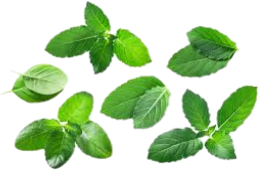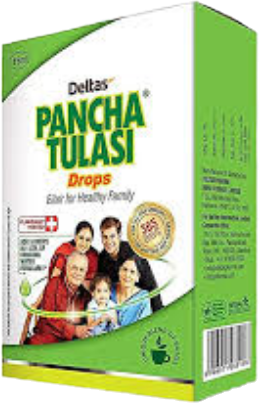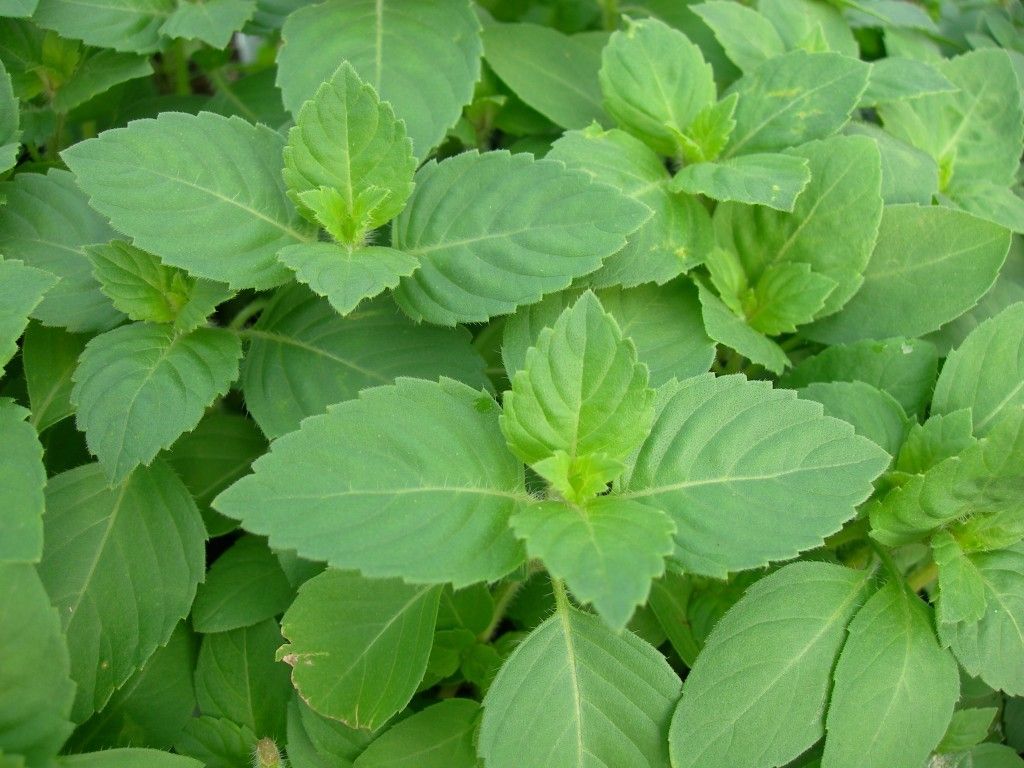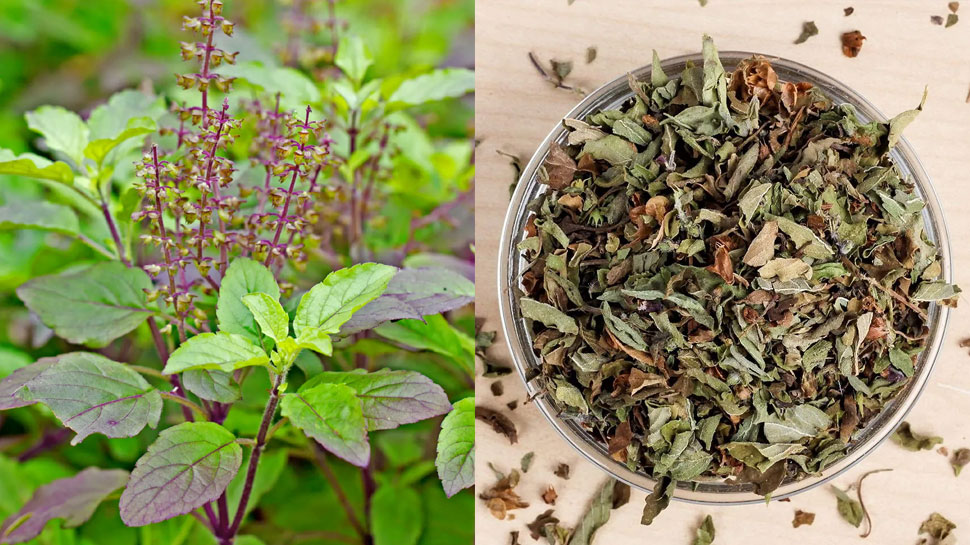Tulsi – Ayurveda’s Queen of Herbs
Tulsi, also known as Holy Basil (Ocimum sanctum), holds a special place in Ayurvedic medicine, revered as a sacred plant in Indian households and temples. For over 3,000 years, Tulsi has been cherished in Ayurveda for its wide-ranging healing properties and profound spiritual significance. It is described as a powerful adaptogen, helping the body cope with stress, and is one of the most well-documented medicinal herbs in both classical texts and modern research.

This article will explore the multifaceted benefits of Tulsi, delving into its significance in classical Ayurvedic texts and how modern science validates its potential in enhancing human health.
Table of Contents
- Tulsi – Ayurveda’s Queen of Herbs
- 1. Introduction to Tulsi
- 2. Classical References to Tulsi in Ayurveda
- 3. Ayurvedic Properties and Actions of Tulsi
- 4. Modern Research on Tulsi
- 5. Health Benefits of Tulsi
- 6. Therapeutic Uses in Ayurveda
- 7. Tulsi in Daily Life: Uses and Applications
- 8. Spiritual Significance of Tulsi
- 9. Contraindications and Safety
- 10. Conclusion
- Other articles
1. Introduction to Tulsi
The Sanskrit name Tulsi means “the incomparable one,” which captures the high regard Ayurveda has for this herb. Native to the Indian subcontinent, Tulsi belongs to the Lamiaceae family, which includes other medicinal herbs like mint and rosemary. It is often found in two main varieties: Rama Tulsi (with green leaves) and Krishna Tulsi (with purple leaves). Each variety has unique properties, but all share the same core therapeutic actions.
Tulsi is often referred to as “The Elixir of Life” due to its rejuvenating and balancing properties, which can impact the body, mind, and spirit.
Why Tulsi is Revered
In Hindu tradition, Tulsi is considered an earthly manifestation of the goddess Tulsi, the consort of Vishnu. It is believed that simply being around the plant can purify the atmosphere and promote health, making it a key feature in Ayurvedic and yogic traditions.
2. Classical References to Tulsi in Ayurveda
Tulsi has been a part of Ayurveda for thousands of years, with references in several classical Ayurvedic texts such as:
- Charaka Samhita: One of the oldest and most authoritative texts on Ayurveda, the Charaka Samhita praises Tulsi for its ability to treat cough, cold, and respiratory conditions.
- Sushruta Samhita: This classical text emphasizes Tulsi’s role in treating wounds, skin diseases, and managing digestive disorders.
- Bhavaprakasha Nighantu: A famous Ayurvedic herbology text, this text categorizes Tulsi as a remedy for Kapha and Vata disorders, describing its anti-inflammatory and antimicrobial properties.
In these classical texts, Tulsi is described as a Rasayana (rejuvenative), promoting longevity and vitality. It is said to balance the doshas (Vata, Pitta, and Kapha) and has a warming nature that can stimulate digestion and immunity.
3. Ayurvedic Properties and Actions of Tulsi
In Ayurveda, each herb is described in terms of its Rasa (taste), Virya (potency), Vipaka (post-digestive effect), and Prabhava (unique action). Tulsi’s Ayurvedic properties are:
- Rasa (Taste): Pungent (Katu), Bitter (Tikta)
- Virya (Potency): Heating (Ushna)
- Vipaka (Post-digestive Effect): Pungent
- Guna (Qualities): Light (Laghu), Dry (Ruksha)
- Dosha Effect: Balances Vata and Kapha, but may increase Pitta in excess.
Actions (Karma) of Tulsi in Ayurveda:
- Deepana (Enhances Digestive Fire): Tulsi strengthens Agni (digestive fire) and helps combat digestive issues like bloating, gas, and indigestion.
- Anulomana (Promotes Proper Movement of Vata): It aids in balancing erratic movement of Vata, which can help alleviate conditions like constipation or bloating.
- Shwasahara (Relieves Respiratory Issues): Tulsi is known for its use in conditions like asthma, bronchitis, and other respiratory disorders.
- Jvaraghna (Reduces Fever): The herb has antipyretic properties and can reduce fever and infection.
4. Modern Research on Tulsi
In recent years, modern research has corroborated many of the ancient claims about Tulsi’s medicinal value. Numerous studies have demonstrated its efficacy in preventing and treating a wide range of ailments, including metabolic disorders, stress-related conditions, and infections. Key findings include:

Antioxidant and Anti-inflammatory Properties
Research has shown that Tulsi is rich in essential oils and phenolic compounds like eugenol, rosmarinic acid, and apigenin, which have potent antioxidant effects. These compounds neutralize free radicals, protecting cells from oxidative damage and inflammation, which are underlying causes of diseases like cancer, cardiovascular disorders, and arthritis.
Adaptogenic Benefits
Tulsi is recognized as an adaptogen, meaning it helps the body adapt to stress and restore balance. In a study published in the Journal of Ayurveda and Integrative Medicine, it was found that regular consumption of Tulsi significantly reduces stress markers and improves mental clarity.
Antimicrobial and Antiviral Effects
Tulsi’s essential oils, particularly eugenol and ursolic acid, have strong antimicrobial properties, effective against bacteria, viruses, and fungi. Studies published in the Journal of Ethnopharmacology demonstrate its efficacy in combating respiratory infections, skin infections, and digestive pathogens like E. coli.
Cardiovascular Health
Several studies have indicated that Tulsi can help reduce cholesterol and high blood pressure, acting as a cardioprotective agent. Its antioxidant action prevents oxidative damage to the heart and blood vessels, reducing the risk of atherosclerosis and other cardiovascular issues.
5. Health Benefits of Tulsi
Given its wide-ranging actions, Tulsi offers numerous health benefits. Some of its key uses include:
1. Respiratory Health:
Tulsi is often used in Ayurvedic formulations for respiratory issues like asthma, bronchitis, cough, and cold. Its warming and expectorant properties help clear phlegm and relieve congestion.
2. Immunity Booster:
Tulsi’s rich antioxidant profile makes it an excellent immunity booster. It helps to build resilience against infections, whether viral, bacterial, or fungal.

3. Stress and Anxiety Relief:
Being an adaptogen, Tulsi helps in reducing cortisol levels, the body’s main stress hormone, making it effective in managing stress, anxiety, and depression.
4. Digestive Aid:
Tulsi enhances digestive fire (Agni), aiding in the digestion of food and absorption of nutrients. It is especially helpful in conditions like indigestion, bloating, and acid reflux.
5. Skin Health:
Tulsi has anti-inflammatory and antimicrobial properties, which makes it effective in treating skin conditions like acne, eczema, and wounds.
6. Therapeutic Uses in Ayurveda
Ayurveda employs Tulsi in various therapeutic formulations:
- Tulsi Juice (Svarasa): Fresh juice from the leaves is used to treat cough, fever, and indigestion.
- Tulsi Oil: Tulsi oil is used topically for skin infections, wounds, and joint pain due to its anti-inflammatory and analgesic properties.
- Tulsi Tea: A popular remedy for respiratory issues and stress management. It can be taken daily to promote general well-being.
- Chyawanprash: Tulsi is one of the key ingredients in Chyawanprash, an Ayurvedic jam that boosts immunity.
7. Tulsi in Daily Life: Uses and Applications
Incorporating Tulsi into your daily routine can significantly enhance your health. Here are some practical ways to use Tulsi:
1. Tulsi Tea:
Boil fresh or dried Tulsi leaves in water, strain, and drink the tea to promote respiratory health and reduce stress.
2. Tulsi Powder:
Dried Tulsi leaves can be powdered and mixed with honey for relief from cough and sore throat.
3. Tulsi Essential Oil:
This can be used for aromatherapy, added to bathwater, or applied topically to the skin to soothe inflammation.

4. In Cooking:
Tulsi leaves can be used as a garnish or in herbal preparations to enhance the flavor of foods and provide health benefits.
8. Spiritual Significance of Tulsi
Tulsi is not only a medicinal herb but also holds immense spiritual importance. In Hinduism, it is worshipped as a deity, and its presence in a household is believed to bring prosperity and protection. The plant is often grown in courtyards or near temples, and its leaves are used in sacred rituals and offerings to deities. It is said that the simple act of watering or caring for the Tulsi plant can purify the body and mind.
Tulsi Puja:
The practice of performing Tulsi Puja is said to bring peace, harmony, and positive energy into the home. It is performed during the auspicious month of Kartik (October-November) in many Hindu homes.
9. Contraindications and Safety
While Tulsi is generally safe for most people, it is important to note the following precautions:
- Pregnancy and Lactation: Tulsi can stimulate uterine contractions and is not recommended for pregnant women in large quantities.
- Diabetes: Tulsi has a hypoglycemic effect, so diabetic patients should consult a healthcare provider before using it alongside medication.
- Blood-thinning Medications: Tulsi may interact with anticoagulants and should be used cautiously by individuals on blood-thinning drugs.
10. Conclusion
Tulsi, revered as the “Queen of Herbs” in Ayurveda, is much more than a medicinal plant. Its ability to balance the body, mind, and spirit has been recognized in classical Ayurvedic texts and validated by modern scientific research. From enhancing respiratory health and boosting immunity to reducing stress and promoting digestive wellness, Tulsi offers a wide range of therapeutic benefits.
By incorporating Tulsi into your daily life, you can not only improve your physical health but also enhance mental clarity and emotional balance. Whether consumed as tea, powder, or used in traditional rituals, Tulsi remains a powerful and accessible herb for holistic healing.
References
- Charaka Samhita: Ancient Text of Ayurvedic Medicine.
- Sushruta Samhita: The Foundations of Surgery and Medicine in Ayurveda.
- Bhavaprakasha Nighantu: A Renowned Herbal Compendium.
- Pandey, G., Verma, R. K., & Singh, M. (2010). Evaluation of Antimicrobial Activity and Phytochemical Analysis of Tulsi (Ocimum sanctum). Journal of Pharmacy and Bioallied Sciences, 2(1), 69-71.
- Mondal, S. Mirdha B., & Mahapatra, S. (2009). The Science behind Sacredness of Tulsi (Ocimum sanctum Linn.). Indian Journal of Physiology and Pharmacology, 53(4), 291-306.
- Here are the direct links to the studies and articles about Tulsi:
- Phytochemical Composition & Antimicrobial Activity: Evaluation of Antimicrobial Activity and Phytochemical Analysis of Tulsi (Ocimum sanctum) published in the Journal of Pharmacy and Bioallied Sciences.
- Antimicrobial Properties Against Oral Pathogens: Antibacterial Activity of Tulsi Against Oral Pathogens published in the International Journal of Health Sciences and Research.
- Phytochemical Studies & Potential Benefits: Phytochemical Analysis and Antimicrobial Study of Ocimum Tenuiflorum in the International Journal of Pharmaceutical Sciences Review and Research.
Other articles
- Top 10 Most Useful Instruments in Physiology- Part 1
- Top 10 Most Useful Instruments in Physiology- Part 2
- Top 10 Most Useful Instruments in Physiology- Part 3
- Top 20 Most comely Useful Instruments in Physiology lab with their classification- part 4
- BEST AYURVEDIC DIET AND NUTRITION GUIDE
- AYURVEDA INTRODUCTION
- Growth of the Ayurveda Wellness Market in 2024: Personalization, Technology, and Global Expansion
- Best 13 Types of Abhyanga With Morden Research & Classical Ayurvedic Texts
If you have any queries regarding this article reach us @globeayush-com and contact us








I really like your blog.. very nice colors & theme. Did you create this website yourself or did you hire someone to do it for you? Plz answer back as I’m looking to create my own blog and would like to find out where u got this from. cheers